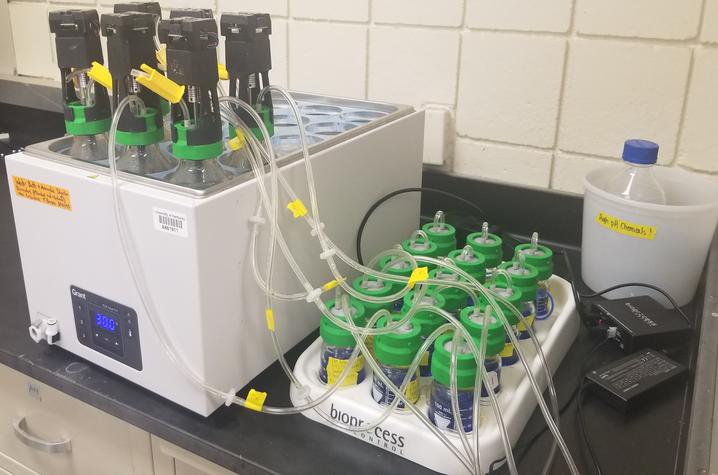Turning waste into fuel: Bourbon industry offers new path for renewable energy

LEXINGTON, Ky. (Nov. 7, 2024) — University of Kentucky Martin-Gatton College of Agriculture, Food and Environment (CAFE) researchers are turning one of the state’s largest and fastest-growing industries into an unlikely renewable energy source.
In a study published in the Journal of Environmental Management led by Tyler Barzee, assistant professor of Biosystems and Agricultural Engineering (BAE) and faculty fellow at the UK James B. Beam Institute for Kentucky Spirits (JBBI), Czarena Crofcheck, professor of BAE and faculty fellow at JBBI, and graduate researcher Danielle Hockensmith, the team discovered that stillage — a leftover byproduct from bourbon and whiskey production — holds the potential to be a sustainable energy supply.
This is where anaerobic digestion, a process that transforms organic material into renewable natural gas by using microorganisms without oxygen, plays a role.
This finding, plus the expectation that bourbon production will double in the next five years, could position Kentucky as a leader in both bourbon and renewable energy.
“Stillage has been piling up, and there just aren’t enough cattle to consume it all,” Crofcheck said. “So, distilleries are beginning to explore new ways to use this material, and renewable energy is one of the most promising solutions.”
Research findings and impact
The team’s research analyzed how the composition of bourbon stillage — affected by the different grains used in production — impacts the amount of renewable natural gas generated. Whiskey and bourbon production involves a variety of mash bills (grain combinations such as corn, rye, barley and wheat).
The researchers found that these differences significantly alter the biogas output during anaerobic digestion. This discovery provides distilleries with critical insights into how their byproducts can be efficiently turned into energy, with each type of mash bill producing different methane and carbon dioxide levels.
While this process is common in waste management for agriculture and wastewater treatment industries, it is still relatively new to Kentucky’s bourbon industry. Some large distilleries are leading the way by incorporating anaerobic digesters to convert their stillage into renewable natural gas. The benefits are twofold: distilleries can use the gas for their operations, reducing their reliance on external energy and lowering waste disposal costs.
The researchers noted that the gas can be used in multiple ways, including fueling trucks, heating homes or generating electricity. This creates a valuable opportunity for distilleries to cut energy costs and become more self-sufficient. Some distilleries are exploring the possibility of using their renewable gas to power their operations, such as steam boilers, which are essential for production.
“This study shows that not only can distilleries help alleviate the environmental burden of excess stillage, but they can also create a circular system where waste turns into fuel,” Barzee said. “This is a local solution that could position Kentucky as a leader in both bourbon and renewable energy.”
The project also highlights the broader impact that stillage-based energy production can have. The researchers calculated the potential energy yield from distillery waste as part of the study. If implemented at scale, anaerobic digestion could provide significant energy, equivalent to powering entire distillery operations or neighboring facilities. It can also be upgraded to renewable natural gas, a pipeline-quality gas that can replace conventional natural gas.
Hockensmith, who worked on the project as part of her master’s research, personally gathered and analyzed 14 different samples of stillage from Kentucky distilleries. This hands-on effort provided a deep understanding of the chemical composition of the byproducts and their potential for energy production.
“This project was extremely exciting because it provided some insight into a much larger problem and provides a potential solution for one of the state's largest industries,” Hockensmith said. “I had the opportunity to visit distilleries I had never visited before. Engineering is all about problem solving and continuous improvement, and this project was exactly that.”
The work is already catching the attention of major distillers, and Kentucky could soon see an increase in digesters dedicated to processing bourbon stillage. Beyond individual distilleries, the research opens doors to regional hubs where smaller producers could contribute stillage to centralized digesters, creating a network of renewable energy production.
The BAE program at UK is a partnership between Martin-Gatton CAFE and the UK Stanley and Karen Pigman College of Engineering. For more information on the department, visit https://bae.ca.uky.edu/.
This project, S1075: The Science and Engineering for a Biobased Industry and Economy, is supported in part by the Hatch Multistate Research Fund through the USDA National Institute of Food and Agriculture and by grants to project members at participating institutions including the University of Kentucky.
As the state’s flagship, land-grant institution, the University of Kentucky exists to advance the Commonwealth. We do that by preparing the next generation of leaders — placing students at the heart of everything we do — and transforming the lives of Kentuckians through education, research and creative work, service and health care. We pride ourselves on being a catalyst for breakthroughs and a force for healing, a place where ingenuity unfolds. It's all made possible by our people — visionaries, disruptors and pioneers — who make up 200 academic programs, a $476.5 million research and development enterprise and a world-class medical center, all on one campus.




